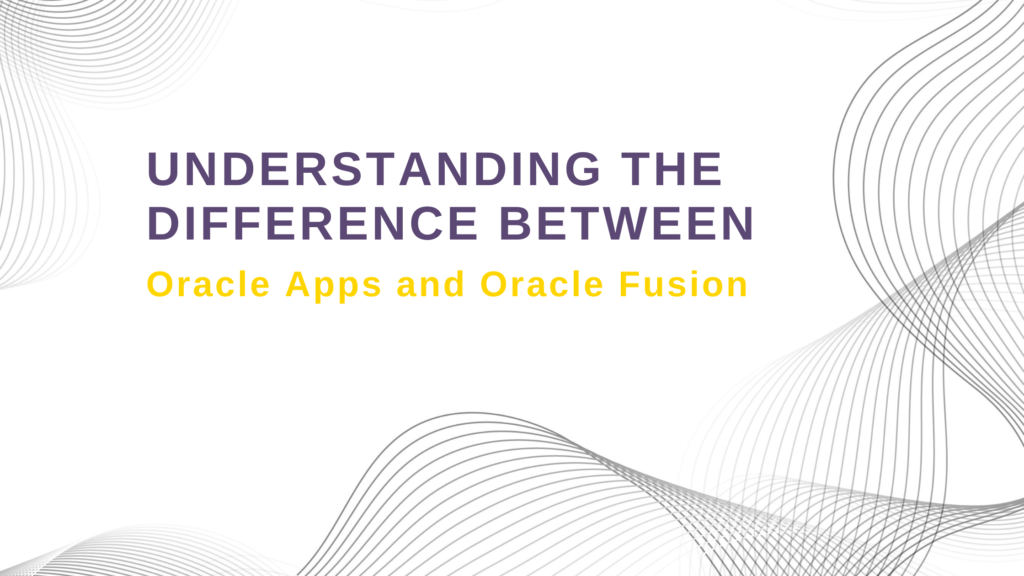Differentiating Oracle Apps from Oracle Fusion

What is Oracle Apps (E-Business Suite)?
Oracle Apps (E-Business Suite), also known as Oracle EBS, is a suite of integrated business applications provided by Oracle Corporation. It is an enterprise resource planning (ERP) software solution that helps organizations manage their business processes and operations efficiently.
Oracle EBS covers a wide range of functional areas, including financial management, human resources, supply chain management, customer relationship management, project management, and more. It offers modules and features that support various industries and business functions.
The architecture of Oracle EBS is based on a traditional client-server model, where the application runs on a server and users access it through client applications installed on their computers. The technology stack of Oracle EBS includes Oracle Forms, Oracle Reports, PL/SQL, and other Oracle database technologies.
Oracle EBS can be deployed on-premises or in a private cloud environment. It provides extensive customization capabilities, allowing organizations to tailor the system to their specific requirements. However, customizations may increase complexity and upgrade challenges.
Oracle EBS has been widely used by organizations across industries for many years, offering a comprehensive suite of applications to manage and streamline various aspects of their business operations.
Oracle Fusion refers to Oracle’s next-generation enterprise application suite that combines the best features and capabilities from various Oracle applications, including Oracle E-Business Suite, PeopleSoft, JD Edwards, and Siebel.
Oracle Fusion offers a comprehensive suite of cloud-based business applications that cover a wide range of functional areas, including finance, human resources, supply chain management, customer experience, project management, and more. It is designed to provide organizations with a unified and integrated platform for managing their business processes.
Unlike the traditional client-server architecture of Oracle E-Business Suite, Oracle Fusion is built on a service-oriented architecture (SOA), which allows for greater flexibility, scalability, and interoperability. It leverages modern technologies such as Oracle Application Development Framework (ADF), Oracle SOA Suite, and Java EE.
One of the key advantages of Oracle Fusion is its seamless integration capabilities. It offers built-in integration with other Oracle Cloud services and supports integration with third-party applications, enabling organizations to connect and streamline their business processes across different systems and platforms.
What is Oracle Fusion?
Oracle Fusion is delivered as a Software-as-a-Service (SaaS) solution, meaning that it is hosted and maintained by Oracle in the cloud. This cloud-based deployment model offers benefits such as faster implementation, regular updates, and patches, and reduced IT infrastructure and maintenance costs.
Oracle Fusion is known for its modern and intuitive user interface, providing a user-friendly experience for employees and enabling them to access and interact with the system from anywhere, on any device.
Overall, Oracle Fusion represents Oracle’s vision for the future of enterprise applications, combining the power of cloud computing, modern technologies, and integrated functionality to help organizations drive digital transformation and achieve operational excellence.
Here’s a comparison between Oracle Apps (E-Business Suite) and Oracle Fusion
| Features | Oracle Apps (E-Business Suite) | Oracle Fusion |
| Architecture | Traditional client-server architecture | Service-oriented architecture (SOA) |
| Technology Stack | Oracle Forms, Reports, PL/SQL | Oracle ADF, Oracle SOA, Java EE |
| Deployment | On-premises or private cloud | Cloud-based (SaaS) |
| Customization | Highly customizable | Configurable with limited customization options |
| Integration | Requires additional middleware for integration | Built-in integration capabilities (SOA) |
| User Interface | Outdated UI (Oracle Forms) | Modern and intuitive UI (Oracle ADF) |
| Upgrades | Complex and time-consuming upgrades | Simplified and seamless upgrades |
| Scalability | Limited scalability and resource utilization | Improved scalability and resource optimization |
| Functionality | Comprehensive functionality for various industries | Streamlined and unified functionality |
| Innovation | Limited innovation and slower adoption of new tech | Embraces latest technologies and innovations |
| Mobile Support | Limited mobile support | Robust mobile support |
| Cost | Higher initial investment and maintenance costs | Lower initial investment and lower TCO |
| Industry Focus | Broad industry coverage | Focus on modern industries and practices |
In conclusion, Oracle Apps (E-Business Suite) and Oracle Fusion are two distinct enterprise application suites offered by Oracle Corporation. Oracle Apps, also known as Oracle EBS, follows a traditional client-server architecture and provides a comprehensive set of applications for managing various business functions. It offers extensive customization options and can be deployed on-premises or in a private cloud.
On the other hand, Oracle Fusion represents Oracle’s next-generation enterprise application suite. It is built on a service-oriented architecture (SOA) and is delivered as a cloud-based Software-as-a-Service (SaaS) solution. Oracle Fusion offers modern and intuitive user interfaces, built-in integration capabilities, and leverages technologies like Oracle ADF and Oracle SOA Suite.
While Oracle Apps is highly customizable, allowing organizations to tailor the system to their specific needs, Oracle Fusion focuses more on configurability with limited customization options. Oracle Fusion also brings advantages such as seamless upgrades, improved scalability, lower total cost of ownership, and a stronger focus on innovation and modern industry practices.
Oracle Apps has a broad industry coverage and has been widely adopted over the years, while Oracle Fusion targets modern industries and practices. Oracle Fusion offers robust mobile support, embraces the latest technologies, and provides a unified and integrated platform for managing business processes.
Ultimately, the choice between Oracle Apps (E-Business Suite) and Oracle Fusion depends on an organization’s specific requirements, preferences, and long-term business strategy. It is important to evaluate the functionality, deployment models, customization needs, integration capabilities, and scalability when considering the best fit for the organization’s enterprise application needs.

Leave a Reply